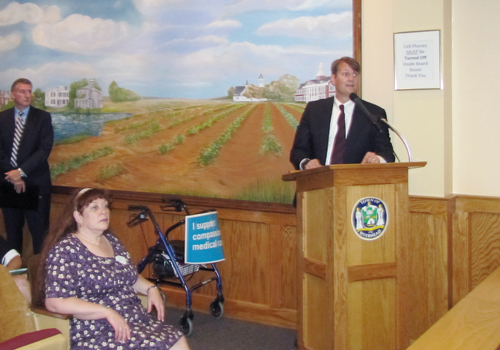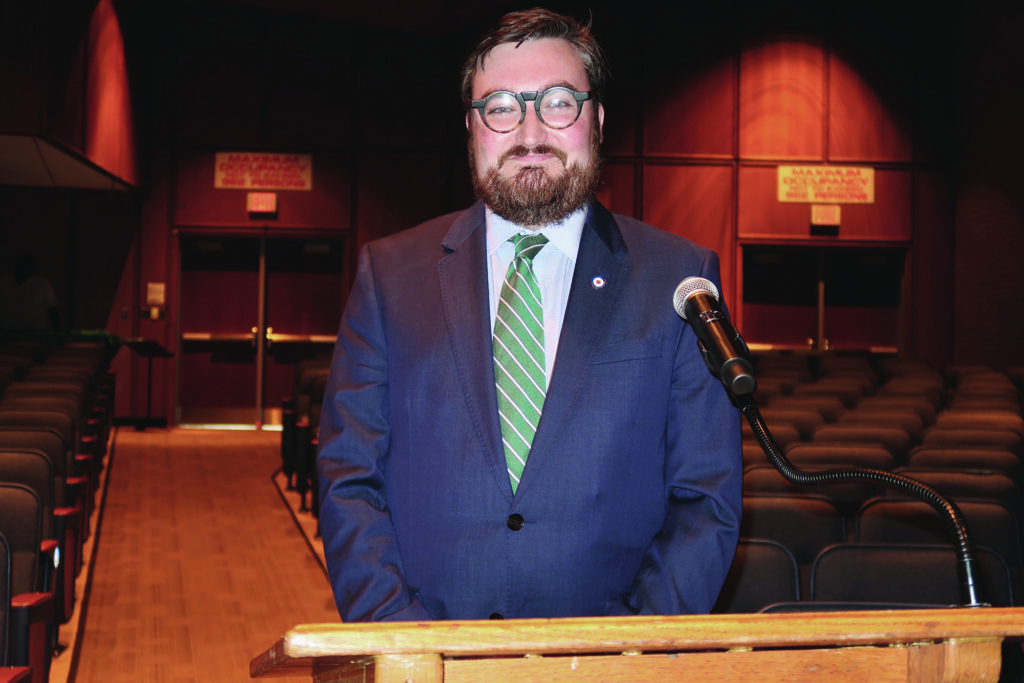Cannabis company purchasing Riverhead greenhouse site for $42.5M

The publicly traded cannabis company that runs the medical marijuana dispensary in Riverhead Town has dramatically upped its stake in the local pot business with a $42.5 million purchase of the Van de Wetering Greenhouses site on Sound Avenue, the company has announced.
Columbia Care said the newly acquired site will supplement the company’s existing medical marijuana growing operation in western New York, better positioning it to cultivate the crop for recreational use.
“This is a commitment to our patients, communities, regulators, elected officials and social equity partners that we are here for the long term and intend to be the leaders who define cannabis in New York State – made in New York, by New Yorkers for New Yorkers,” Columbia Care CEO Nicholas Vita said in a statement.
The 34-acre property features about 740,000 square feet of existing greenhouse infrastructure and the capacity to potentially expand another 200,000 feet, Columbia Care said in a press release. The company said it has already paid $15 million in cash for the purchase and an additional $15 million in stock options. The transaction is expected to be completed in August with the transfer of an additional $12.5 million in stock options.
Columbia Care said it expects to complete its first harvest and sales by the end of this year. It noted that Van de Wetering has previously successfully grown commercial hemp at the site.
State lawmakers approved the recreational use, sale and cultivation of marijuana earlier this year and are currently developing regulations for the industry. Columbia Care opened Suffolk County’s first medical marijuana dispensary on East Main Street in January 2016. Van de Wetering family members, Jack and Kurt Van de Wetering, coincidentally put in a bid around that time to cultivate the crop at Ivy Acres in Baiting Hollow, but it was not one selected by the state.
The sale of the greenhouses is the first reported cannabis-related land transfer since the state legalized recreational marijuana.

Mr. Vita said in his statement this week that his company believes New York’s “regulated market [will] emerge as one of the top global cannabis markets.”
“Some market size estimates exceed $5B by 2025 and more than 75,000 jobs created by 2027,” he said. “We intend to continue to invest in opportunities that support this growth for all.”
In its own announcement, Van de Wetering Greenhouses said it has entered into a multi-year lease with Columbia Care to share in the continued operation of the greenhouses.
“This is an incredible opportunity for Van de Wetering Greenhouses and every one of our constituents, including our dedicated workforce, long-standing customers and the local community,” VDW owner and president Walter Gravagna said in a statement. “This transaction allows us to continue servicing our customers while transitioning production space over to cannabis as the market demand increases. We are very excited to work with Columbia Care who is already our neighbor in Riverhead.”
While the specific terms of the lease agreement in Riverhead have not been made public, Columbia Care has been involved in sale-leaseback agreements, a growing trend in the cannabis industry, in California, Illinois and Massachusetts, according to various trade reports.
North Fork real estate broker Sheri Winter Parker said that while the sale price might seem high at first, it makes sense given the value of a growing license. She said in some states licenses have been valued as high as $30 million.
“The land is valuable, but the real value is in obtaining a license,” Ms. Parker said.
North Fork commercial real estate broker Kristopher Pilles said the price tag of the Van de Wetering sale is sure to impact the market moving forward.
“At the end of the day this is farmland and if a new use for farmland justifies this sort of premium then all of the prior metrics are no longer relevant,” he said. “If you extrapolate the cost of greenhouses and reduce this from the price based on square foot you still end up with a massive dollar per acre that good, bad or otherwise, appraisers, lenders, buyers and sellers will reference on future transactions.”
Riverhead Town Councilman Frank Beyrodt, who is also executive vice president of DeLea Sod Farm, said the governor’s proposal to legalize recreational marijuana in the state made such a transaction inevitable.
“It’s a game changer whether you like it or not,” he said of the state legislation.
County Legislator Al Krupski, himself a farmer, said he had not yet been notified of the sale, but said it’s “no surprise” given the existing infrastructure. He said the sale to Columbia Care gives a more clear indication as to the type of company that will enter the pot market here.
“The romantic notion that pot would be grown by mom and pop farmers by the strawberry patch is not reality,” he said. “It will be a big business, and it will be highly regulated.”
Southold Town Supervisor Scott Russell said the sale shows “big money talks.”
“It shows that legalization will not benefit the local farmer in Southold,” he said.

Riverhead Town Councilman Tim Hubbard said Columbia Care’s involvement should help the project receive local support as it enters the regulatory phase.
“If they do the growing portion the way they have run a dispensary, I have no problem with it,” Mr. Hubbard said. “They’ve been a good neighbor, they’ve been a good business in town, they’ve supported a lot of our projects, they’ve donated to a lot of events like Alive on 25.
“We know that marijuana is coming. We know it’s going to be growing.”
Mr. Beyrodt said the big question facing local municipalities is not in regards to cultivation, but it remains whether or not to allow dispensaries and public consumption cafés in Riverhead and other towns.
“We still have to go to the public and figure out whether they want any of these cafés,” he said. “To me, that’s up to the public completely.”








